10 Amazing Benefits of Eating Protein

There’s a reason why bodybuilders and gym-goers fill their plates with protein. The benefits of protein are far-reaching, and eating more of this macro can help you lose weight, keep your metabolism humming, and both build and maintain lean muscle, which translates to more strength and less body fat (hello, toned arms and abs!).
The Recommended Dietary Allowance (RDA) for a sedentary adult is 0.8 grams of protein per kilogram of body weight or 0.36 grams of protein per pound of body weight. That comes out to an average daily intake of 46 grams of protein for women and 56 grams of protein for men, according to the United States Department of Agriculture (USDA).
Despite these public health-focused recommendations, research shows that many of us should be aiming for much more—sometimes even double these numbers. A 2016 review published in the journal Food & Function noted that an adequate daily protein intake for simply maintaining physical strength should be 1.0, 1.3, and 1.6 grams of protein per kilogram of body weight for individuals with minimal, moderate, and intense physical activity, respectively. Getting 1.6 grams of protein per kilogram of body weight was shown to help spur muscle growth when coupled with resistance training, according to a 2018 Nutrients study.
So sure, this superstar macro helps you build and maintain lean muscle, but it’s also responsible for a whole host of health perks. Below, read up on all the benefits of protein, and then fill your cart with The 15 Best High-Protein Foods to take advantage of everything this nutrient has to offer.
It can help reduce cravings.
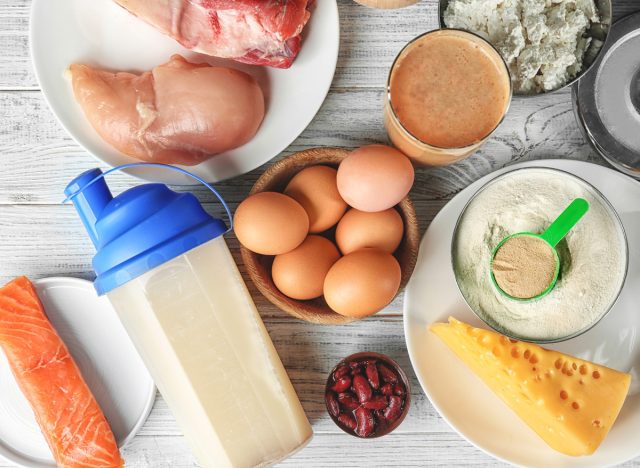
Protein has an effect on our hormones that regulate hunger, in particular the hormones ghrelin and peptide YY (PYY). “Ghrelin helps by suppressing hunger signals and PYY has been shown to reduce food intake and increase energy expenditure,” says Megan Hilbert, MS, RDN, a dietitian with Top Nutrition Coaching.
Research shows that eating a high-protein meal can help suppress ghrelin (the hunger hormone) while increasing PYY (which helps suppress appetite), acting as a double whammy against cravings.
Protein can help you lose excess weight.
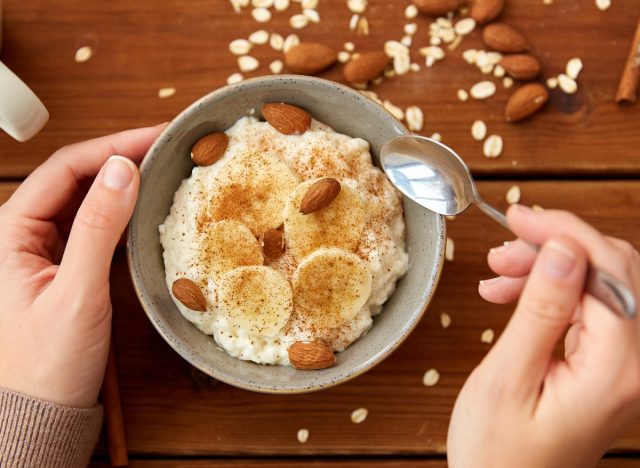
Protein is a satiating nutrient, meaning it can help keep you feeling fuller for longer, and if you’re not as hungry as you usually are, you’ll likely end up eating fewer calories. Translation: You’ll support your weight loss goals.
“Protein has a higher thermic effect of food (TEF) compared to carbohydrates and fats, meaning your body burns more calories in the process of digesting, absorbing, and utilizing protein,” says Jordan Hill, MCD, RD, CSSD, with Top Nutrition Coaching. “Because muscle mass is more metabolically efficient than fat mass, the more we have of it, the more calories we burn at rest compared to someone who may have more fat mass.”
That’s why getting enough protein when you’re trying to lose weight is so important. “Eating adequate protein can assist in muscle mass maintenance, leading to a higher caloric burn at rest compared to those losing muscle mass during their weight loss journey,” Hill says.
It can help you build and maintain muscle.
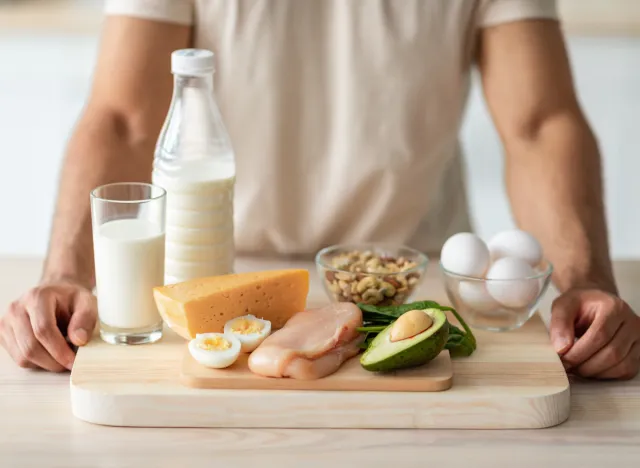
One of the most well-known benefits of protein is its ability to support muscle building. Building muscle is key to staying lean and strong, and you can’t grow or maintain your muscles on a low-protein diet. “Protein plays a crucial role in building and maintaining muscle through a process called muscle protein synthesis (MPS),” Hill says.
Muscle protein synthesis is exactly as it sounds: It’s the creation of new muscle protein molecules to repair and grow muscle tissue. “Combining adequate protein intake with resistance training and proper meal timing can optimize muscle protein synthesis and contribute to muscle development and overall strength,” Hill says. So if you’re regularly lifting at the gym, don’t let your efforts go to waste by skimping out on protein.
Protein can boost your metabolism.

Everyone’s looking to boost their metabolism these days, but what does that really mean? Simply put, “boosting the metabolism” refers to increasing the rate at which your body burns calories or expends energy, Hill says. This can help support weight management, energy levels, nutrient utilization, and blood sugar control.
Now, here’s where protein comes into play: “Protein can contribute to a boosted metabolism through its higher thermic effect of food compared to carbohydrates and fats, and in its role in muscle maintenance,” Hill says. Because of its high TEF and its ability to help build and maintain muscle, protein can help your body burn more calories at rest, which indicates an increase in metabolism.
It can help you prevent injury as you age.
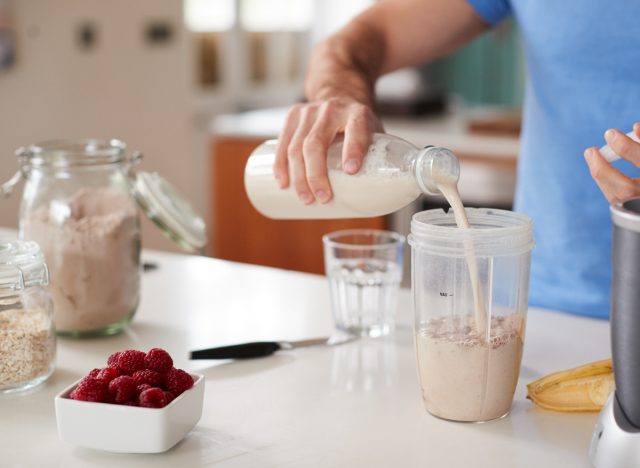
Protein helps build and maintain muscle, and that’s especially important as you age because of the unfortunate phenomenon called sarcopenia. “Sarcopenia is the gradual loss of muscle mass that begins in our 30s and continues into old age,” Hilbert says.
But getting enough protein can help with this natural process by ensuring our muscles have the building blocks they need. And here’s the kicker: Losing muscle mass can contribute to a reduced ability to do basic activities, such as climbing a flight of stairs and carrying groceries, as well as an increased risk of injury, Hilbert says.
Getting enough protein can help you maintain muscle mass and strength to continue doing basic activities injury-free. And coupling a high-protein diet with resistance training will build more muscle—a double whammy against sarcopenia.
It can support your immune system.
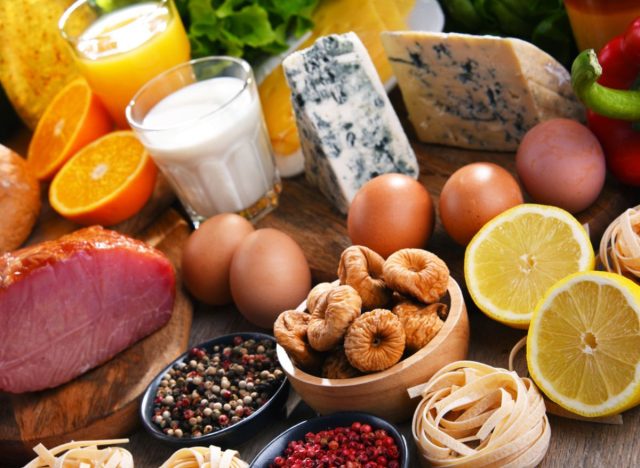
Protein plays a role in keeping your immune system strong, and that’s especially important as we enter cold and flu season. “Proteins are the building blocks of key players in our immune response, like T cells, B cells, and antibodies that spot harmful cells and kill them before they can start infecting the body,” Hilbert tells us.
“Protein also promotes the synthesis of glutathione, which is an important antioxidant that prevents stress in immune cells.” In fact, not having enough glutathione is linked with a higher risk of chronic diseases such as autoimmune conditions and cancer, per a 2014 report in Integrative Medicine. As if you needed another reason to make chicken soup this winter.
It’s good for your gut health.

While fiber and probiotics get all the credit for helping support gut health, protein is also very essential to keeping your microbiome in good shape. “Proteins are the building blocks for the lining of our gut, including the villi and microvilli, which absorb nutrition from our food and promote proper nutrition status,” says Hilbert. Our gut health not only affects our digestive process, but also other things like metabolism, skin, and brain health.
What’s more, “Up to 70% of our immunity lies within our gut, so proteins can help reduce inflammation and keep our digestive system healthy,” adds Hilbert. To keep your gut health in tip-top shape, try making a parfait with unsweetened Greek yogurt (which is high in both protein and probiotics) and high-fiber berries.
Protein is key to healthy skin.
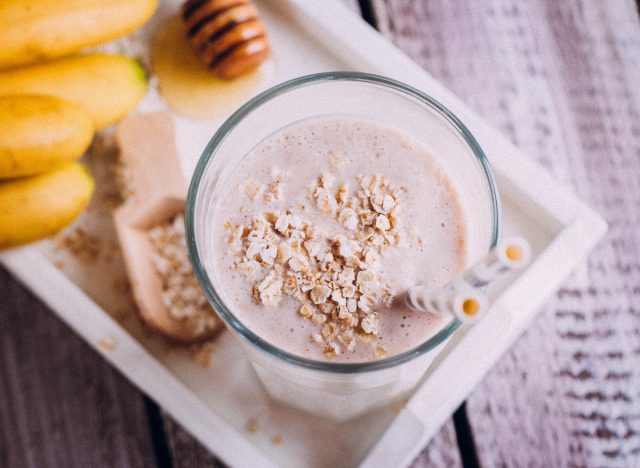
Getting enough protein in your diet can help with collagen production, wound healing, and skin structure. Collagen is the most abundant protein in your skin and is essential for maintaining skin’s strength, elasticity, and hydration, Hill tells us. Eating protein-rich foods (think: lean steak, edamame, tofu, and turkey) provides the necessary amino acids for collagen synthesis.
When it comes to wound healing, protein is crucial for the body’s ability to repair and regenerate tissues, including the skin. “When you have a wound or injury, your body requires protein to create new skin cells and tissues, facilitating the healing process and minimizing scarring,” Hill says. In addition to this, keratin—which is, you guessed it, a type of protein—is essential for the structure of hair, skin, and nails, says Hilbert.
It helps strengthen your bones.
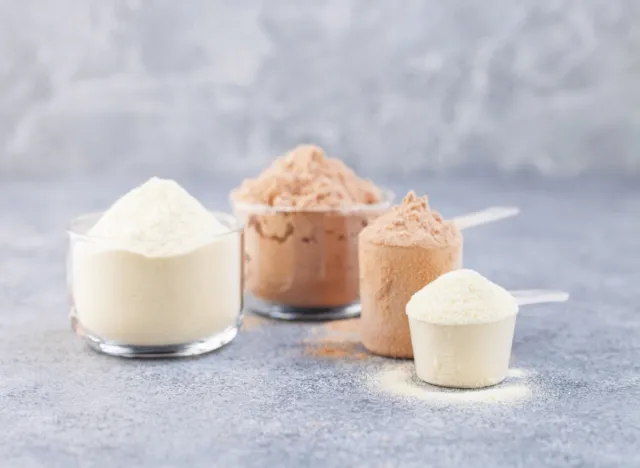
Sure, collagen is key for healthy skin, but this protein also supports your skeleton. “Collagen is the primary protein in your bones, providing structural support and flexibility,” Hill says. “Protein intake is essential for collagen formation, and collagen is crucial for maintaining bone strength and preventing fractures.” Not only that, but your protein intake can affect calcium absorption in the body. “When you consume protein-rich foods, they can enhance the absorption of calcium, a mineral critical for bone health,” she says.
And as we know, protein is essential for maintaining muscle mass—but your muscles actually also support bone health. “Muscles provide mechanical stress on bones, and the stimulation of bone tissue through activities like weight-bearing exercise can promote bone density,” says Hill.
It’s crucial for healthy joints.
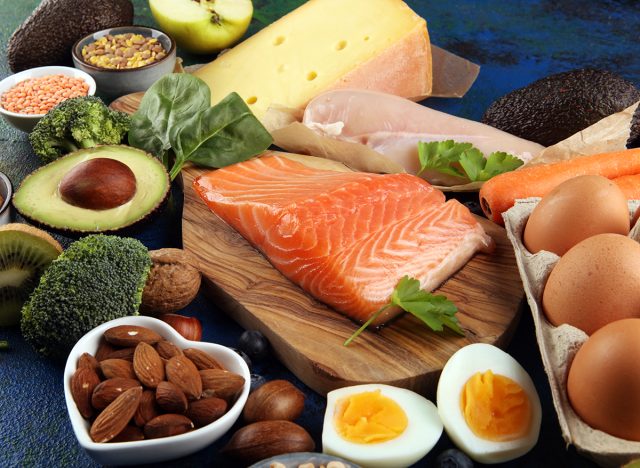
Joint health is closely tied to the health of the cartilage that cushions and protects the ends of bones in your joints. And collagen is a significant component of cartilage. “Adequate protein intake helps maintain cartilage integrity and may support joint health,” Hill says.
Again, your muscles play a role here, too. “Strong muscles help stabilize joints and reduce the stress placed on them during daily activities and physical exercise. Adequate protein intake is essential for maintaining muscle mass, which, in turn, can support joint stability and function,” Hill says.
- Source: https://nap.nationalacademies.org/read/10490/chapter/12
- Source: https://health.gov/sites/default/files/2019-09/Appendix-E3-1-Table-A4.pdf
- Source: https://www.ncbi.nlm.nih.gov/pmc/articles/PMC5852756/
- Source: https://www.ncbi.nlm.nih.gov/pmc/articles/PMC2775646/
- Source: https://www.ncbi.nlm.nih.gov/pmc/articles/PMC4684116/









